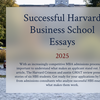He arrived at Harvard in 1971 on a National Merit Scholarship, where he lived in Weld as a freshman and quickly took an interest in economics.
“Once he got into economics, he found that he really liked it,” says Jorgenson, who advised Bernanke’s undergraduate thesis.
Bernanke excelled, winning the Allyn A. Young Prize for the best Harvard undergraduate economics thesis in 1975 with his paper, “An Integrated Model for Energy Policy.”
He was elected to Phi Beta Kappa as a resident of Winthrop House, and received the John H. Williams Prize, which is awarded to the most outstanding senior in the Harvard Economics Department.
“He was a superstar in every dimension,” says Jorgenson. “He was at the absolute top of the economics concentrators of his year.”
“HIS OWN GUY”
Upon graduation from Harvard in 1975, Bernanke moved down Mass. Ave.to MIT to continue his studies.
At MIT, he examined economic growth and periods of recession, such as the Great Depression.
“He did an extremely interesting thesis on trying to understand pauses of economic growth,” says Cabot Professor of Public Policy and Professor of Economics Kenneth S. Rogoff, who was an economics student at MIT at the same time as Bernanke.
Bernanke’s thesis “led to a lot of rethinking” in the study of growth, Rogoff adds.
Nobel Laureate Robert M. Solow ’44-’47—an Institute Professor Emeritus at MIT— who taught Bernanke, says his independent thinking stood out.
“He was, even as a graduate student, his own guy,” says Solow. “He had his own ideas, and he worked not necessarily on what was fashionable at the time.”
“He was always interested in monetary matters,” Solow added.
“HE HELPED BUILD OUR DEPARTMENT”
After receiving his Ph.D. in 1979, Bernanke held teaching positions in MIT’s Department of Economics and Stanford University’s Graduate School of Business before landing at Princeton University in 1985.
Read more in News
Claims Spark Debate in UC












